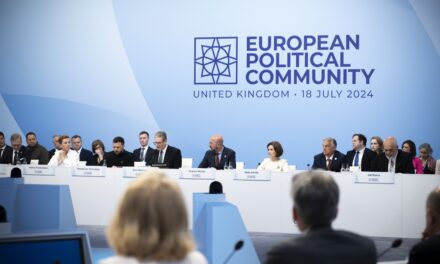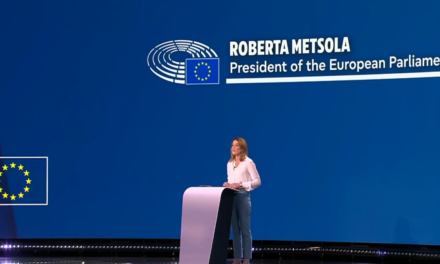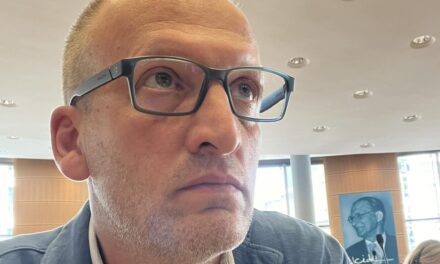The European Commission recommends granting Ukraine candidate status. Will the obviously political and fairness-based decision help Kiev? It certainly does not strengthen the credibility, consistency and unity of the European Union. Moreover, Ukraine's possible EU membership could even mean the end of the EU.
Perhaps it is no coincidence that the Kremlin has no problem with the European integration of our eastern neighbor. He sees very well what it would do for Kiev and Brussels. We were just smiling at the fact that since the outbreak of the war, Ukraine has won every international competition, starting with the Eurovision Song Festival, but it is less funny that the European Union is also likely to offer Kyiv a candidate status. In the current, partly artificially whipped up, moralistic approach to everything, everyone wants to help Ukraine in their own way, and Kiev is trying to get the most out of the situation.
He thinks he has everything right now and tries to capitalize on the role of victim.
He does this in a demanding, irritating style that also destroys the authority of the European Union. Falling in love with his role, Volodymyr Zelenskiy is already talking about – perhaps even believing – that the candidate status will bring Ukraine closer to victory.
It is easy to see that the European Union would dig its own grave by annexing Ukraine in the foreseeable future. It would not be easy to integrate a country of this size even if its economy was not in the same state as Ukraine's. Turkey, which is similar in size but much more prosperous, has perhaps already given up hope of joining. Moreover, the union did not even really digest the 2004 and 2007 enlargement rounds. But in the light of the promise made to Kiev, it is also inexplicable why the integration of the countries of the Western Balkans, which is a much easier task than Ukraine, is progressing so slowly. And if we are talking about the approximation of the post-Soviet countries to the union: it is also a mystery why Ukraine and Moldova - not to mention the two poorest states in Europe at the moment - can be granted candidate status, if Georgia, which is far ahead in the fight against corruption, for example, can only be trusted.
According to the current situation, Albania, North Macedonia, Montenegro, Serbia and Turkey are candidates for EU membership. Kosovo and Bosnia-Herzegovina are possible candidates, and they will be joined by the three post-Soviet states depending on the decision of the EU summit. It would be unacceptable if any country from the latter three could approach Brussels at a faster pace than the others, so if the European Union wants to admit Ukraine for reasons of conscience or politics, then it has two choices:
either he hires the other candidate candidates, which will split him apart, or none of them, which further destroys his credibility.
While the United States benefits economically, politically and strategically from the Russian-Ukrainian conflict, Europe is shooting itself in the foot step by step. Seeing the suicidal sanctions and unprovoked harshness, it is not surprising that the European Commission said yes to Ukraine, which brazenly demanded EU membership, and Ursula von der Leyen, dressed in blue and yellow, excitedly announced the offer of candidate status. According to the President of the European Commission, Ukraine has clearly demonstrated its commitment to European Union values, the country has been gradually approaching the EU for years. Earlier in Kiev, he directly claimed that he had already fulfilled 70 percent of the Copenhagen criteria. Patting on the back of President Zelenskiy, the European giants Emmanuel Macron, Olaf Scholz and Mario Draghi also supported the granting of candidate member status.
Of course, when the cameras were turned off and the train left Ukraine, the EU leaders were already talking about a long journey of at least a decade and a half, and it even turned out that Scholz, with German thoroughness, also handed over a list in Kiev that outlined the conditions for the progress of Ukrainian integration.
Among these, Berlin mentioned the establishment of a functioning rule of law, the liberalization of the economy, the fight against corruption, and even the transformation of the European Union itself. And the fact that not everyone got their medicine in Brussels indicates that, unlike in previous similar cases, the committee indicated this time that if Ukraine does not fulfill its obligations, it reserves the possibility of a decision to revoke the status. In connection with this, the Ukrainian Yevropeyshka Pravda noted that with this Brussels essentially said that Ukraine is not prepared to be a candidate for membership, yet it will receive the status.
The Ukrainians also know very well that they are currently unfit to take the first step of European integration.
There are more questions about Ukraine's rule of law than its 27 members combined. If we only look at the past year, we can mention the disabling of the opposition even before the war. Some parties are simply banned, others are under pressure. Politicians were arrested by bypassing the court, the National Security Council essentially became an extended hand of power, a tool for carrying out purges. It follows that the judiciary is not independent. Not so much that Zelenskiy would have simply dissolved even the Constitutional Court, exceeding the powers of the president. But not only parties, but also opposition TVs and other media outlets were banned, so the balance of the media was also severely tipped before the war. The freedom of the press was further restricted during the war.
Perhaps Ukraine's biggest cancer is the oligarchic system. The oligarchs, i.e. individuals with extraordinary wealth and political weight, have perhaps no more influence in any post-Soviet country than in Ukraine. When Volodymyr Zelensky launched a campaign against them last year, it wasn't about liquidating the system, but about power struggles.
Through the example of the Transcarpathian Hungarians, we can see more closely that not only human rights, but also minority rights related to language use and mother tongue education are seriously violated in Ukraine. In recent years, successive presidents and governments have ignored the Venice Commission's recommendation in this regard. And then we didn't even talk about the state of the economy, the financing of which would have been a serious burden for the European Union even without the war. This is why the war came, so this year, according to forecasts, the economy will shrink by half. The country lies in ruins. The war will also affect public security, which was already problematic, since something will have to be done with the large number of weapons in the hands of the population even after the cease-fire, the sudden peace agreement.
The list could be continued, the examples could be listed for a long time. However, you don't need to be an expert to see that Ukraine is currently ineligible for EU membership.
But it doesn't even make sense to discuss it, since we don't even know where its borders will be in a year.
Thus, with the exception of a few countries – Austria, Denmark – the majority presumably do not voice their reservations simply because they see the granting of candidate member status as a moral gesture, pushing professional criteria aside. Secretly believing that integration itself is realistically a matter of a decade or two. This may have been on Vladimir Putin's mind when he said at the podium discussion following his speech in St. Petersburg: "Unlike NATO, the EU is not a military-political bloc, which is why we have always said, and I still say now, that our consistent position is understandable: we have no objection to it." .” In fact, the majority also hopes that, based on an anecdote related to the former Russian Prime Minister, later Ambassador to Kyiv, Viktor Chernomyrdin
Ukraine will become a member of the EU only after Turkey.











